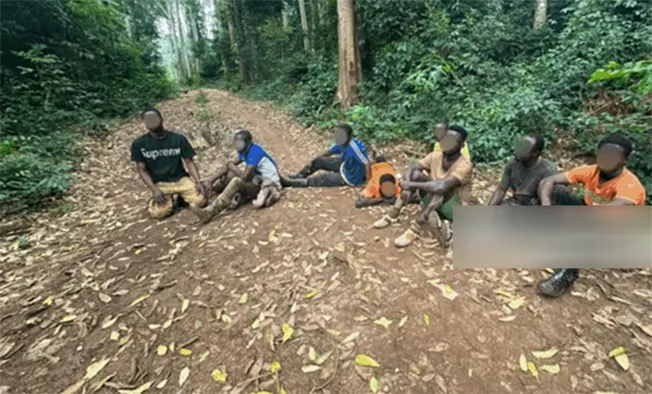The arrest of Nana Kwadwo Poku, the Nkosuohene (Development Chief) of Minti, a farming community in the Bosome Freho District of the Ashanti Region, Ghana, for his alleged involvement in illegal mining activities within the Bosomtwe Range Forest Reserve has sent shockwaves through the region. This incident underscores the pervasive nature of illegal mining, commonly known as “galamsey,” and the lengths to which individuals, even those in positions of traditional leadership, will go to profit from this destructive practice. The arrest also highlights the ongoing efforts by Ghanaian authorities to combat galamsey, which has devastating environmental and social consequences. The chief’s arrest alongside four other suspects – Mohammed Martey, Kwame Signah, Akwasi Amadu, and Yaw George Asirifi – paints a picture of a collaborative effort in carrying out these illegal operations.
The operation that led to the apprehension of Nana Kwadwo Poku and his accomplices was a joint effort between the Forestry Commission Management Team and the Rapid Response Unit. Acting on intelligence, the team raided Compartment 30 of the Bosomtwe Range Forest Reserve, where the suspects were actively engaged in illegal mining. The operation uncovered an excavator and other mining equipment being used to extract gold from the protected forest area. The extent of the damage inflicted upon the reserve by the illegal mining activities is significant, underscoring the urgent need to curb this destructive practice. The confiscated equipment served as tangible evidence of the illegal activities taking place within the forest reserve.
The immediate aftermath of the arrest involved the seizure of various items, including a motorbike, a power plant, and an air blower fuel tank, which were subsequently set ablaze within the forest by the arresting team. This act, while seemingly drastic, could be interpreted as a symbolic demonstration of the authorities’ resolve to dismantle illegal mining operations and deter future transgressions. It also potentially served the practical purpose of rendering the recovered equipment unusable, thereby preventing it from being redeployed in further illegal mining activities. However, other reports suggest that additional equipment seized during the operation was handed over to the police as evidence to bolster the ongoing investigation.
This incident raises crucial questions about the role of traditional leaders in combating illegal mining and the effectiveness of existing measures to protect Ghana’s natural resources. Nana Kwadwo Poku’s alleged involvement in galamsey, despite his position as a community leader tasked with development and well-being, reveals a potential conflict of interest and an apparent disregard for environmental protection. This begs the question of whether some traditional leaders are complicit in illegal mining operations, either directly or indirectly, and whether this compromises efforts to curb the practice.
The arrest of the Nkosuohene and his accomplices highlights the challenges faced by law enforcement agencies in enforcing environmental regulations and prosecuting those involved in illegal mining. The complexities of galamsey operations, often involving powerful individuals and well-organized networks, necessitate robust intelligence gathering, inter-agency collaboration, and stringent legal frameworks to effectively combat this environmental menace. Furthermore, it emphasizes the need for increased community involvement and awareness campaigns to educate the public about the detrimental effects of galamsey and to foster a collective responsibility for safeguarding the environment.
The case of Nana Kwadwo Poku and his alleged involvement in illegal mining within the Bosomtwe Range Forest Reserve stands as a stark reminder of the pervasiveness and detrimental impact of galamsey in Ghana. It underscores the necessity for a multi-faceted approach to combatting this illegal practice, encompassing robust law enforcement, community engagement, and the accountability of individuals in positions of authority. The long-term consequences of unchecked illegal mining, including environmental degradation, loss of biodiversity, and socioeconomic disruption, necessitate urgent and sustained efforts to address this issue and protect Ghana’s natural heritage for future generations. The incident also raises questions about the efficacy of current strategies and the need for a more comprehensive approach to tackling galamsey, including addressing the underlying socioeconomic factors that drive individuals to engage in such activities.














